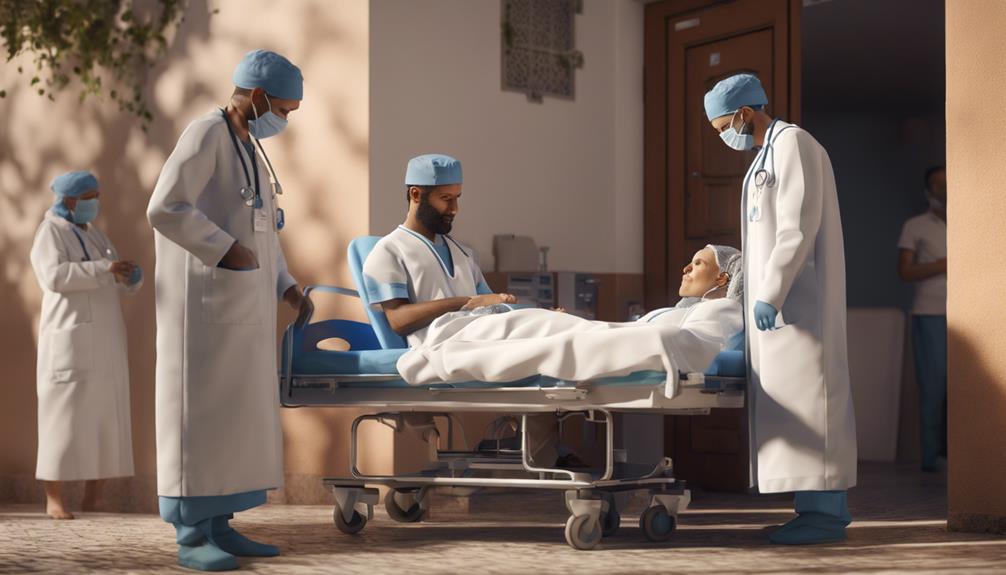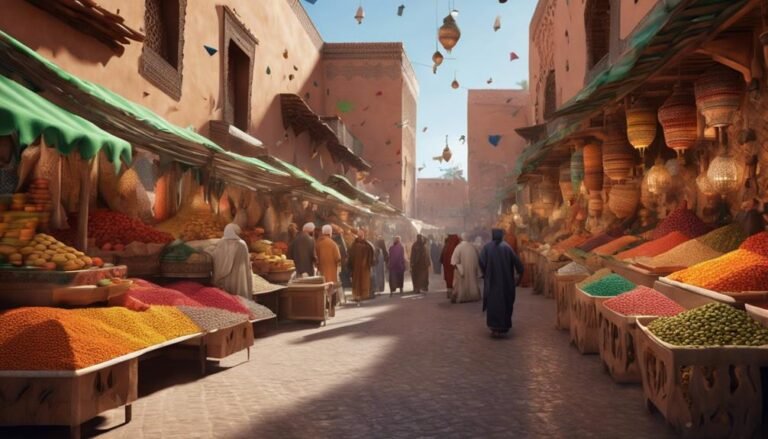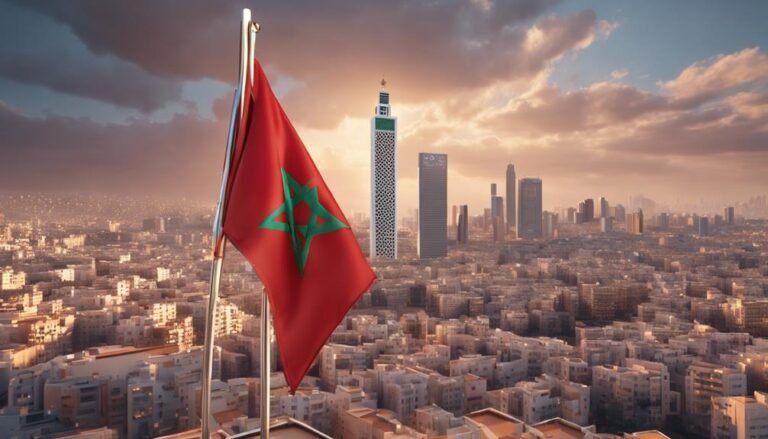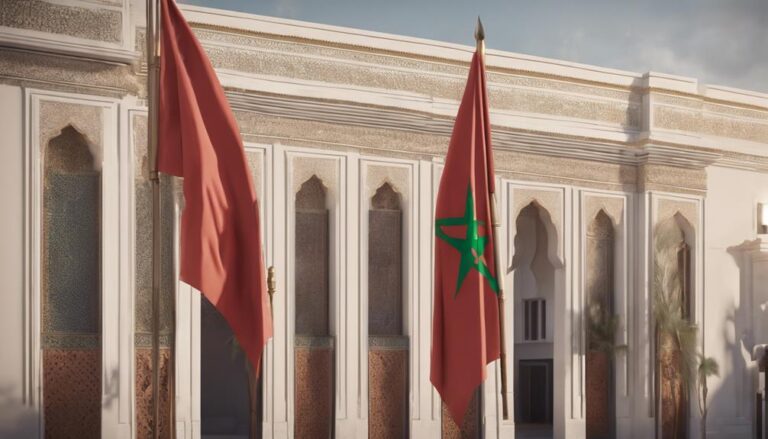When facing medical emergencies in Morocco, understand the local healthcare system for timely care. Know emergency numbers like 19 for police and 150 for ambulances. Seek local help, stay calm, and communicate clearly. Address language barriers using translation services and key medical phrases. Use public transport, emergency services (150), or ride-hailing for quick transportation. Confirm travel insurance coverage and comprehend policy details. Communicate openly with medical professionals, ask questions, and follow advice for better outcomes. Remember, post-emergency care is crucial. Follow up with doctors, attend check-ups, and monitor recovery. Prioritize your health in uncertain times.
Key Takeaways
- Know emergency contact numbers (150 for ambulance).
- Seek medical assistance promptly.
- Use translation services for language barriers.
- Arrange transportation to the nearest hospital.
- Ensure travel insurance coverage and follow claim process.
Understanding the Local Healthcare System
When facing a medical emergency in Morocco, understanding the local healthcare system can greatly impact the care you receive. Exploring healthcare in a foreign country can be challenging, especially when cultural differences and language barriers come into play. In Morocco, the healthcare system may operate differently from what you're used to, so being prepared is key.
One important aspect to take into account is the emergency response time. In urban areas, the response time is generally quicker compared to rural areas. Knowing the nearest hospitals or clinics beforehand can save precious time during an emergency. Additionally, familiarize yourself with the procedures for seeking medical help, as they may differ from those in your home country.
Cultural differences can also influence the way healthcare is provided. It's important to be respectful of local customs and practices when interacting with healthcare professionals. Additionally, language barriers can hinder effective communication with medical staff. Consider carrying a translated medical document or using translation apps to guarantee clear communication during emergencies. By being aware of these factors and preparing in advance, you can navigate the local healthcare system in Morocco more effectively.
Knowing Emergency Contact Numbers
When in Morocco, it's important to know essential contact numbers for local emergency services. Having quick access to these numbers can make a significant difference in handling medical emergencies promptly.
Familiarize yourself with the emergency contact numbers to make sure you can swiftly get help when needed.
Essential Contact Numbers
In case of emergency situations in Morocco, make sure to have the essential contact numbers readily available for quick access.
- Police: Call 19 for immediate police assistance in case of criminal activities or emergencies requiring law enforcement intervention.
- Ambulance: Dial 150 for urgent medical assistance or to request an ambulance in the event of a medical emergency.
- Fire Department: In case of fires or accidents requiring firefighting services, call 15 to reach the fire department promptly.
- Tourist Police: For tourists needing assistance or support, dial 0524-448-787 to reach the tourist police who can provide guidance and help in multiple languages.
Local Emergency Services
If you ever find yourself in an emergency situation in Morocco, having knowledge of the local emergency services and their contact numbers is vital for prompt assistance.
In Morocco, the general emergency number is 190 for police, 150 for the fire department, and 141 for medical emergencies. Calling these numbers will connect you to the appropriate emergency response teams who can dispatch help to your location swiftly.
It's essential to stay calm and provide accurate information about the situation to guarantee the best possible assistance. Medical facilities in Morocco are generally well-equipped to handle a variety of emergencies, but contacting emergency services promptly is key to receiving timely and effective care.
Stay informed and prepared to act swiftly in case of any medical emergency.
Finding Medical Assistance Quickly
To quickly find medical assistance in Morocco during emergencies, look for the nearest medical facility or clinic in your vicinity. When time is of the essence, following these steps can help you navigate the situation effectively:
- Emergency Numbers: Dial 150 for an ambulance or 190 for the police if needed. These numbers can connect you with local emergency services promptly.
- Local Assistance: Seek help from locals who can guide you to the nearest medical facility. In Morocco, people are generally helpful and willing to assist during emergencies.
- Transportation: If you're unable to reach a medical facility yourself, ask for assistance in arranging transportation. Taxis or local drivers can be helpful in getting you to a hospital quickly.
- Stay Calm and Communicate: Remain composed and try to communicate clearly with the medical staff or locals. Even if there's a language barrier, staying calm can help ensure efficient care.
Dealing With Language Barriers
Dealing with a medical emergency in Morocco can become more challenging when faced with language barriers. Communication plays an important role in receiving the necessary medical assistance promptly and accurately. In such situations, translation services can be invaluable, helping bridge the gap between different languages and ensuring that important information is effectively conveyed. However, it's important to be mindful of cultural differences that may influence how information is interpreted.
Interpreter assistance can also greatly aid in overcoming communication challenges during medical emergencies. Having someone who can accurately translate your symptoms and medical history to healthcare providers can greatly improve the quality of care you receive. It's important to remain patient and calm, as language barriers can be frustrating, but with the right assistance, misunderstandings can be minimized.
Being prepared with key medical phrases in the local language can also be beneficial in urgent situations. By acknowledging and addressing language barriers proactively, you can navigate medical emergencies in Morocco more effectively.
Handling Transportation During Emergencies
During a medical emergency in Morocco, making sure swift and effective transportation to a healthcare facility is vital for receiving timely medical care. When faced with such situations, it's important to act promptly to access the necessary help. Here are some key points to keep in mind:
- Emergency Response Team: Contact local emergency services by dialing 150 for an ambulance. Provide clear and concise information about the situation and your location to guarantee a prompt response.
- Public Transportation: In urban areas, contemplate using taxis or public transportation to reach the nearest hospital quickly. Make sure to have the address or name of the healthcare facility handy.
- Ride-Hailing Services: Utilize ride-hailing apps like Uber or local services such as Careem for a convenient and fast way to transport the patient to a medical center.
- Private Transportation: If available and feasible, arrange for private transportation like a rental car or a friend/family member's vehicle for immediate transfer to a hospital.
Using Travel Insurance Effectively
When it comes to using your travel insurance effectively, understanding your policy coverage details is essential to avoid any surprises during emergencies.
Make sure to familiarize yourself with the claim process tips to streamline your reimbursement and reduce stress during a medical crisis.
Being informed about your insurance can make a significant difference in how smoothly you can navigate unexpected healthcare situations while traveling.
Policy Coverage Details
To guarantee you make the most of your travel insurance, it's crucial to comprehend the policy coverage details thoroughly. Here are some key points to keep in mind:
- Policy Limitations: Familiarize yourself with any restrictions or caps on coverage to avoid surprises during emergencies.
- Coverage Exceptions: Be mindful of situations or conditions that may not be covered by your insurance to prevent unnecessary expenses.
- Insurance Eligibility: Make sure you meet all the requirements to be eligible for the insurance benefits before you travel.
- Claim Requirements: Familiarize yourself with the necessary steps and documentation needed to file a successful claim in case of a medical emergency.
Understanding these aspects will help you navigate your travel insurance effectively.
Claim Process Tips
Make sure you understand the steps involved in the claim process to effectively utilize your travel insurance in case of a medical emergency. Dealing with a medical crisis is already stressful, so being prepared can make a significant difference.
If you encounter language barriers while trying to file a claim, consider seeking assistance from communication professionals provided by your insurance company. These experts can help bridge the gap and ensure that your claim is processed smoothly.
Keep all relevant documentation handy, such as medical reports and receipts, to expedite the process. Promptly inform your insurance company about the emergency and follow their guidelines closely.
Communicating With Medical Professionals
In times of medical emergencies in Morocco, effectively communicating with medical professionals can make a significant difference in the quality of care you receive. Here are some key points to keep in mind when communicating with medical professionals:
- Be Open and Honest: Provide accurate information about your symptoms, medical history, and any medications you're taking. Building trust through honesty is crucial for effective treatment.
- Ask Questions: Don't hesitate to inquire if you don't understand something. Clear communication ensures that you're well-informed about your condition and treatment options.
- Express Your Concerns: If you have any worries or fears, share them with the medical team. They're there to support you, and addressing your concerns can help alleviate anxiety and improve your overall experience.
- Follow Up: After receiving instructions or treatment, make sure to check back with the medical professionals as advised. This shows your commitment to your health and allows for continuity of care. Effective communication is a two-way street that can lead to better outcomes in emergency situations.
Following up After the Emergency
After an emergency in Morocco, ensuring proper follow-up care is essential for your continued well-being. Post-emergency care plays a significant role in your recovery process.
It's important to follow up with the medical professionals who initially treated you, as they can provide valuable insights into your progress and any additional steps needed for your well-being.
Engaging in regular check-ups can help monitor your recovery and address any lingering issues promptly.
Conclusion
So, now you're an expert on handling medical emergencies in Morocco!
Just remember, when in doubt, just throw some couscous at the situation and hope for the best.
But in all seriousness, stay informed, be prepared, and don't forget your travel insurance.
And if all else fails, just remember that mint tea can cure anything (or at least make you feel better).
Stay safe out there!

The Editorial Team is a passionate group of Morocco enthusiasts dedicated to sharing the beauty, culture, and wonders of this captivating country. With diverse backgrounds and a deep love for travel, we strive to bring you engaging and informative content that inspires your Moroccan adventures. From uncovering hidden gems and sharing local insights to exploring mouthwatering cuisine and showcasing the vibrant lifestyle, our team is committed to providing you with valuable resources and exciting stories that enhance your exploration of Morocco. Join us on this journey as we celebrate the rich heritage and unforgettable experiences that make Morocco truly special.







